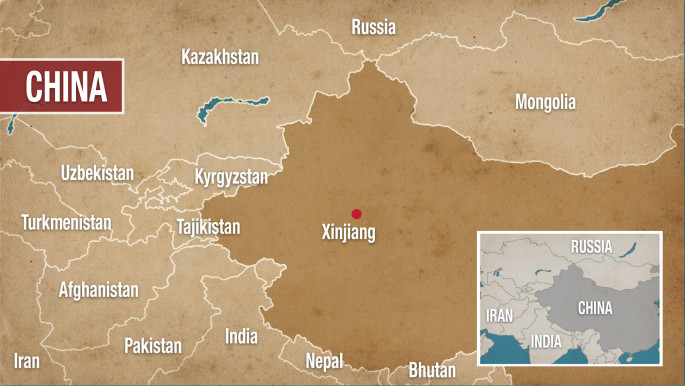Kazakh families torn apart in China's Xinjiang crackdown
But now Emin County where he grew up is a sealed-off pocket in a region experiencing a security crackdown against what Beijing calls separatist elements.
Over a million people are allegedly being held in a secretive network of extra-judicial, political re-education centres, according to a United Nations panel of experts.
In an interview with AFP in Kazakhstan, Kaliolla, a 34-year-old national, said this year he'd lost contact with his mother, father and two younger brothers, who he believes were interned in one of the camps.
"What they are doing to people there, especially to my parents, is illegal," the professional musician said, during the interview in Kazakhstan's largest city, Almaty.
"They are not livestock but people with rights. Both of my parents are elderly and in ill health."
 |
About 1.5 million ethnic Kazakhs live in Xinjiang, a region that borders Central Asia and has long been home to ethnic tensions.
They had until recently avoided the kind of state repression of which the mostly Muslim Uighurs, who make up the region's demographic majority, have long complained.
But Kaliolla is just one of many to have been separated from relatives across the border, as the Chinese authorities now train their sights on the ethnic Kazakhs.
He said that he knows of "around a hundred people" either interned in the camps or with relatives there.
"Lots of them are the same people I watched get married," he added.
His only contact with the missing family members in over six months was in August, when his brother got in touch at the request of Xinjiang authorities, he said.
He demanded that Kaliolla stop "speaking out imprudently" about their situation, as this would only bring them harm, he explained.
| Read Also:In-depth : Explainer: China's persecution of Uighur Muslims |
Advances in surveillance
A report by Human Rights Watch on political repressions in Xinjiang said rights violations in the nominally autonomous region "are of a scope and scale not seen in China since the 1966-1976 Cultural Revolution."
What has changed since that time, according to the report released in September, are advances in surveillance techniques and bio-data collection that are being practised systematically on largely Muslim minorities.
In August, Beijing described as "completely untrue" the claim by a United Nations human rights panel that over a million ethnic Uighurs and other ethnic minorities had been placed in re-education camps.
Kaliolla, who moved to Kazakhstan after meeting his future wife, a citizen, at a music school in Xinjiang, said his family was targeted because his father spoke out against injustices perpetrated by police in Emin County.
"My father was a legal counsellor there. When the government began putting more and more pressure on the Kazakh people, he wrote an appeal to the central authorities in Beijing," he told AFP.
 |
Eight months and no contact! Help us, please! - a Kazakh woman |
 |
'Help us, please'
Unlike Uighurs, many of whom say they face cultural and religious repression, Kazakhs had long moved freely between China and their historic homeland.
That freedom disappeared after hardline official Chen Quanguo, known for his control measures in Tibet, became the Xinjiang Communist Party chief in 2016.
China has pointed to a series of attacks in Xinjiang by suspected Islamist radicals in recent years as justification for the clampdown.
With concerns growing over the rights of the region's ethnic minorities, neighbouring Kazakhstan has inadvertently become the focus for those speaking out.
Kazakhstan officials themselves have steadfastly refused to refer specifically to the camps, even after voicing concern over the situation.
But Kazakh nationals with relatives missing in Xinjiang have been more forthright, sharing stories of despair and separation at press conferences in Almaty.
"Eight months and no contact! Help us, please!" exclaimed one woman, Gaukhar Kurmanaliyeva, to reporters in August.
Kurmanaliyeva spoke of how her male cousin, a Kazakh citizen, was snatched by Chinese police at a shopping area at the border.
Her account was followed by that of Muratkhan Kasengazy, who said his wife - another Kazakh passport holder - had been held in China since December 2017 after going there for medical treatment.
In recent months, Kazakhstan risked China's wrath by refusing to deport an ethnic Kazakh woman of Chinese citizenship, who had confessed to crossing the border illegally to join her husband and children.
The woman, Sayragul Sauytbay, became an international media sensation after testifying in a court hearing that she had been forced by Beijing to work in a re-education camp, where, she said 2,500 ethnic Kazakhs were interned.
Rare happy endings
Kazakh Foreign Minister Kairat Abdrakhmanov said in August that his country was in dialogue with Beijing over nearly 700 cases of Kazakhs unable to leave China.
In some instances, the approach appears to have borne fruit.
Guzalnur Jeniskazy went to China to visit relatives in 2016, leaving her four-month-old daughter at home for what was meant to be a short trip.
But she ended up spending several months under house arrest and even a short stint in detention after losing her Kazakh passport, she told AFP correspondents, who witnessed her emotional family reunion at an Almaty bus station in July.
"Thanks to the Kazakh consulate (in Urumqi, Xinjiang) I was freed," she said, holding her daughter tightly pressed to her.
Such happy endings seem a rarity, however.
Dependent on China's economic largesse and seeking a pivotal role in its trillion-dollar trade and infrastructure drive, the oil-rich Central Asian country is poorly placed to make demands, analysts say.
"Kazakhstan's leverage over China is miserly," Aidos Sarym, an Almaty-based political scientist, told AFP.
"If China does not bend to the European Union and the United States, what can we say of Kazakhstan?"
Agencies contributed to this report.
Follow us on Twitter: @The_NewArab





 Follow the Middle East's top stories in English at The New Arab on Google News
Follow the Middle East's top stories in English at The New Arab on Google News


